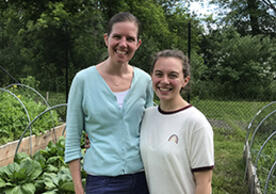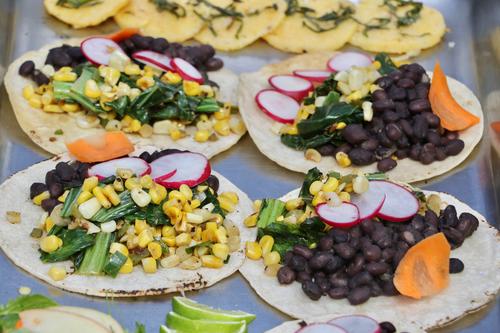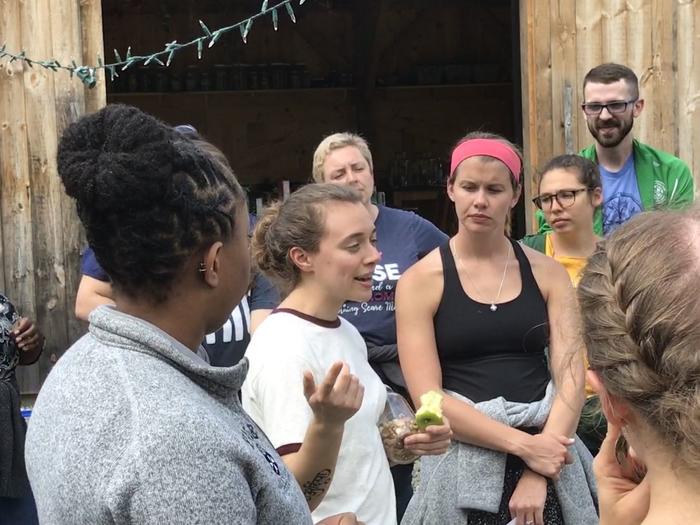
Vanessa Correia, RN, CLC, YSN ’19 (pictured on the right), is a second year MSN student, and teaching assistant to Michelle Kennedy (pictured left), lecturer of the Community Health Nursing and Public Health course for students in the first year of the Graduate Entry Prespecialty in Nursing (GEPN) program. Vanessa is passionate about utilizing food as medicine. In Spring 2018, she founded the Nutrition that Heals lecture series, supplementing Kennedy’s course. She shared with us how her passion for nutrition evolved and why she feels this subject is critical to convey to future providers.
“The Nutrition that Heals lecture series is an expression of my own journey through understanding the importance of nutrition in medicine. I went vegan originally for the health of our environment upon learning that animal agriculture contributes more to global warming than all transportation combined (USDA). At the time, I was living in Jordan working with Save the Children Fund in the world’s second largest refugee camp. The ethics of hunger began to strike me as I learned that the majority of the world’s grains are fed to animals in order to fatten them rather than be fed to the hungry. When my own dad passed away just months later, I began considering the moral implications of inflicting suffering on those animals. And last but certainly not least, I began researching the health effects of the Standard American Diet that I thought killed my father. Through all of this, I came to one concrete conclusion: there is no doubt that a whole food, plant-based diet is optimal for human health.

The series was designed by myself and a team of equally passionate YSN students with the intention of providing an introduction to plant-based, evidence-based nutrition. The group included Emma Hoffman, Casey Magis-Agosta, Emma Kleck, Maddy Kenler, Maya Chay, and Gerardo Acosta. We also owe thanks to G-Zen Organic Restaurant and Heartfelt Catering, who donated funds and provided meals for our guests. We chose to start with a general introduction to plant-based diets in order to provide a comprehensive understanding of the nutrients necessary for health. A deeper dive into food insecurity at a local level in New Haven followed in order to provide realistic context for how to counsel low-income patients on changing their food choices. The next lecture focused on the racial histories of diet and ethics behind our food system in order to give our audience insight into the reality of how people make food choices in urban areas. Our final lecture was given by Dr. Robert Ostfeld, a Yale School of Medicine alumnus, on the scientific evidence base behind reversing heart disease with a whole food plant-based diet. The series was funded and supported by the Yale Wellness Grant.

The evidence base for food as medicine began forming many decades ago and the most recent updates on plant-based nutrition have expanded rapidly in the past few years. While master’s students do receive a handful of didactic hours of nutrition education, many lectures that present nutrition cite research that is outdated or one-sided and fail to incorporate issues on food insecurity and food justice. However, this is not only an issue at our school. Health professional schools have historically failed to meet recommendations regarding more nutrition hours in their curricula despite it being a national goal for over fifty years.
We want this in our education. “Better health for all” is immaculately exemplified in the use of nutrition as prevention and as treatment for lifestyle illnesses. It is an injustice to patients that we are not taught the evidence base behind the root causes of our top killers. It is that much more of an injustice to our minority patients, who are the most negatively affected by heart disease and cancer statistics. The students behind Nutrition that Heals strongly believe that this matters. We believe that YSN can and should be a leader in this inevitable paradigm shift that is more sustainable, more ethical, more logical, and more effective than disease-centered approaches to health.
As for me, my passion lies in making wellness accessible for children living with toxic stress. I grew up in an impoverished household with toxic stress ruling my childhood. I want to support kids when they need it most so their situations will not define them. I believe the foundation of every treatment plan should include a more whole food plant-based diet, stress management, and physical movement. This is the only starting place in which we can truly heal the body. And the lives of our patients certainly deserve to be healed and supported.”
Vanessa Correia, RN, CLC, YSN ’19
